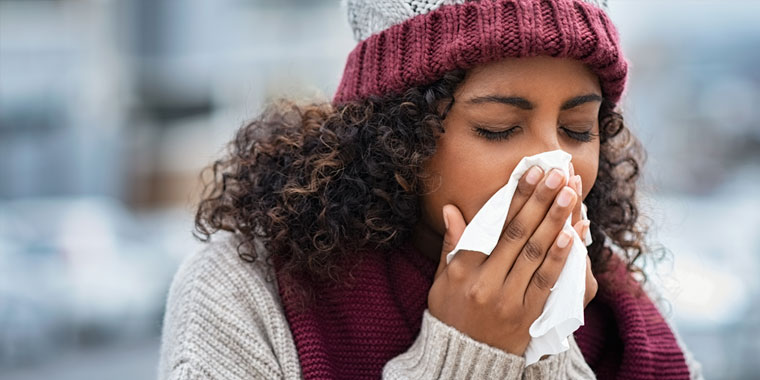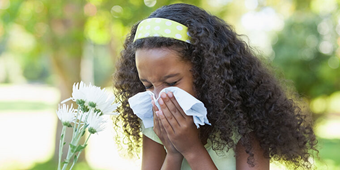A Dose Of Truth: 9 Old Wives’ Tales About Colds, Fevers, and Flu

Answer a few questions and we'll provide you with a list of primary care providers that best fit your needs.
We’ve all heard old wives’ tales about health remedies, passed down from generation to generation. They’re stated as time-tested advice, but how much truth is contained in these traditional sayings?
The short answer is “not much,” according to nurse practitioner Sara Wilson-Rector, APRN-CNP, FNP-C. She sets the record straight on nine common old wives’ tales related to cold-weather illnesses:
- Starve a cold; feed a fever. There’s no real validity to either recommendation, Wilson-Rector says.
Instead, “the big thing is to make sure you are staying hydrated. Water is best, and sports drinks are OK in moderation. Nourish your body properly with a well-balanced diet and avoid junk food.”
- Wear a coat or you’ll “catch a chill.” In reality, you won’t catch a virus or bacterial infection from being outside in the cold without a coat. The same holds true if you go outside with your hair wet, Wilson-Rector
says. The value of wearing a coat in cold weather is that it “helps keep your normal body temperature, which helps your immune system.” She adds that wearing a hat can also help you regulate body temperature. But contrary to traditional
thought, you don’t lose more heat through an uncovered head than anywhere else.
- Eat chicken soup to cure a cold. Although chicken soup won’t cure a cold virus, adding hearty vegetables and protein to maximize nutritional value can boost your body’s ability to fight off the cold, Wilson-Rector recommends.
The steam from a bowl of chicken soup may provide some relief from a stuffed-up nose.
- Avoid dairy products if you have a gastrointestinal (GI) virus or a cold. This statement is false on both counts. If you have vomiting or diarrhea, dairy products won’t make these symptoms worse, but dairy also may not be appealing.
“The number one goal is to stay hydrated, because you are losing fluid,” Wilson-Rector says. “The recommended diet with a GI virus is sports drinks, bananas, rice, applesauce, and toast.” If you have a cold, it’s
not true that milk and milk products create more mucus. So, don’t hesitate to drink them if that’s what tastes best to you.
- Vitamin C can cure a cold, and gargling with saltwater can cure a sore throat. Not exactly, Wilson-Rector says. Vitamin C can help prevent a cold by boosting the immune system, and it’s better to get it through a food-based
source. A vitamin C pill has some preventive benefit, as well. Vitamin C is not an effective treatment once you have a cold, however. Regarding gargling with saltwater, she says, “It may feel good, but it won’t cure anything. Dryness
from sleeping with your mouth open can cause soreness, so hydration is good for soothing it.”
- A flu shot can give you the flu. “A flu shot does not give you the flu,” Wilson-Rector says emphatically. If you do feel a bit rundown or have a low-grade
temperature after getting a flu vaccine, it’s due to your body mounting an immune response to a synthetic version of the virus. With the highly contagious COVID-19 pandemic going on, she asks, “Why not protect yourself from this other
deadly virus?”
- Treat a fever with cold compresses or a cool bath. Acetaminophen (such as Tylenol) and ibuprofen (such as Motrin) are more effective ways to lower a high temperature in children and adults, Wilson-Rector says. Cold compresses on the
forehead may feel good and won’t do any harm. Don’t immerse a child or adult in a cool bath without a doctor’s advice. This course of action is occasionally recommended by doctors to prevent febrile (fever-induced) seizures for
children whose temperatures have risen quickly.
- Don’t go outside or exercise if you have a cold. Although getting enough sleep and rest are important, Wilson-Rector strongly recommends some physical activity. “Don’t overdo, but it’s good to keep yourself
moving. Do something a little less vigorous than your normal. Maybe a runner can go for a walk, for example.” She does caution that you should avoid being out with others, since colds are contagious. Symptoms of a cold also overlap with
the highly contagious COVID-19, making it difficult sometimes to distinguish one from the other.
- Put Vicks VapoRub on your feet to relieve cold symptoms. VapoRub actually works best to relieve coughing and stuffy nose when rubbed into the chest or throat. The feet are too far away to have any effect. VapoRub should not be placed
directly in or near the nose, however, because it contains camphor, which can be harmful if absorbed into the body. Vicks VapoRub should not be used in children under age 2.
Answer a few questions and we'll provide you with a list of primary care providers that best fit your needs.
Source: Sara Wilson Rector, APRN-CNP, FNP-C, Premier Health Family Care of Vandalia





